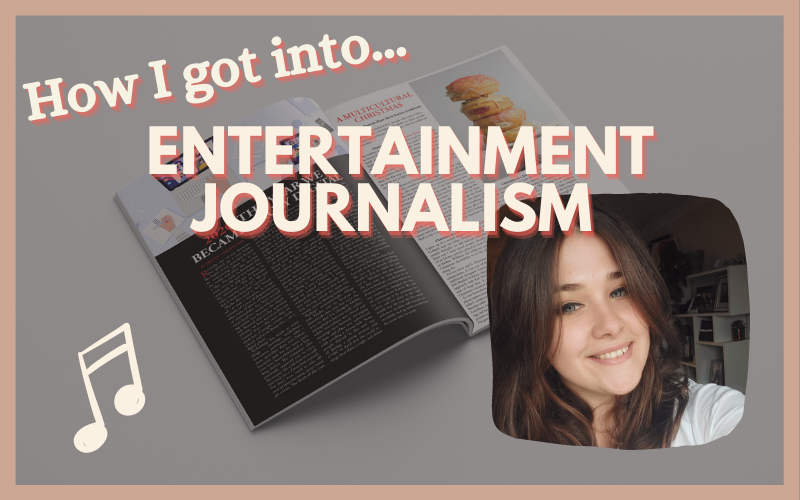How I got into… entertainment journalism
We spoke with Beth Kirkbride, editor of The Indiependent magazine and News Associates alumna, about how she got into entertainment journalism and what her advice would be for people wanting to break into the industry.
BETH’S ROUTE INTO ENTERTAINMENT JOURNALISM
What made you want to become a journalist?
When I was in sixth form, I reached out to the investigative journalist who discovered J.K. Rowling was writing under a pseudonym. He replied to me and explained his process, and I found it so interesting. It made me realise there was a whole other industry that was of interest to me, and I fell in love with journalism from there.

What was your path to a journalism career?
One of the first things I started doing was social media for a company called Social Sheffield when I was about 15. Through them I then started writing for Gigslutz, and I got to upload my own stuff to WordPress.
I then started working on a blog which snowballed and later became The Indiependent. We had contributors from across the UK, emailing in saying they were sixth form or university students and they wanted to get involved. We now have contributors from across the globe!
As a trainee at News Associates I wrote for their in-house publication South West Londoner. News Associates are lovely and I can’t recommend them more!
All our trainees get the chance to write for our in-house publications South West Londoner and Mancunian Matters.
What is your favourite entertainment piece you’ve written?
I was proud of the Folklore album review I did this year – and that’s because Taylor Swift has been a lifelong love. Her country album was the first album I ever bought with my own money. I was really interested in this album because sonically it was such a change for her.
Who are your journalism idols?
My main one is Caitlin Moran. She started as a music journalist and is from a massive family. I’m also from a massive family, so there’s always been an affinity there. We both love eyeliner and have quite big hair!
I really like Emily Maitlis – her book Airhead is incredible; it’s really interesting the way it jumps from pop culture to politics.
I went to an amazing workshop with Laura Snapes from The Guardian. They’re the big three for me!
You can read our list of the best journalism books here, including Moranthology by Caitlin Moran!
Saturday 9pm. BBC2. No holds barred interview – no questions vetted- with Prince Andrew. https://t.co/erRkhJ1hTd
— emily m (@maitlis) November 15, 2019
GETTING INTO ENTERTAINMENT JOURNALISM
Can you be too young or too old to make it as a journalist?
Definitely not! The Indiependent team in 2020 has become a super diverse organisation to work for. We have year 10s and 11s who are just doing their GCSEs up to late stage career changers. You’re never too old to change and you’re never too young to start. The Indiependent offers coaching for those who are just starting, and we give feedback on how your writing can be better next time.
What are your three top tips for entertainment journalism writing?
- For music reviews, listen to the album or song at least twice so you can properly compare – and that’s a bare minimum!
- Don’t project your views onto the audience. Saying thing like ‘the audience feels’ is such a sweeping statement. You can’t speak to everyone’s experience. Not everyone is going to relate to something in the same way you do – consider why people might care about what you’re writing about.
- Think about the piece of media as a thing that lots of people have worked on. For a film, it’s not just about the plot and acting – it’s about the directing, the production, the costumes, the makeup… give people credit where its due! People work really hard on different aspects of an art piece to make the cohesive whole.
You can read more of Beth’s entertainment writing tips in our School of Journalism masterclasses blog.
Here are @BettyKirkers top tips for writing reviews! She says: “A good review contrasts the strengths with the weaknesses” and should inform the reader why they should or should not invest their time in something 📺 pic.twitter.com/VIQucTPxkn
— School of Journalism (@TheJournoSchool) October 29, 2020
Do you have any tips for people who want to break into the industry?
Start your own blog or even a Tumblr account. Write about things you watch or see, like a roundup of the best books or films you’ve read or seen this year.
You could also email your local newspaper to see if you can get work experience. You could send a DM to journalists you admire and get some advice.
Write for The Indiependent – we have people on our team who are aged 15 or 16! There are always platforms that are willing to work with you.
If you’re a student journalist, read our guide on how to make the most of student media here.
How important is social media for aspiring journalists?
You should 100% use social media to shout about your work from the mountain tops! Do whatever you can to put the word out there, especially when you’re starting out.
Online communities like the Young Journalist Community and The Indiependent team are great because we build each other up and share each other’s work.
Choose a social media platform and reflect what you’re passionate about so that editors might notice and want to commission you. You can have a Linktree in your bio with links to stuff you’ve written too.
Finally, find journalism pages you’re interested in, like News Associates and The School of Journalism, and follow them and engage with their content!
What are the biggest mistakes aspiring journalists make?
I don’t think a lot of people know what a pitch should look like. Journo Resources is a great platform to find out more on this.
We also get a lot of people who don’t spellcheck their work. Don’t spell artist’s names wrong – it makes me want to bang my head against a wall!
If you’re writing for a publication that has a style guide, follow it! It’s important you are consistent and adhere to the house style – it will mean your work gets published quicker.
STUDYING JOURNALISM
Do you have to have a degree in journalism to get into entertainment journalism?
You don’t have to have one, but it does make it easier if you do, especially if you’re planning on freelancing. Having media law under your belt makes it easier to navigate the mysterious world of libel.
If you want to do a journalism degree, find out how to apply through UCAS here.
🌟 Introducing our A-Z guide to journalism! 🌟 From top tips to the golden rules of reporting, we’ve got you covered. Read our thread below ⬇️ and our blog here: https://t.co/pvanuTxc1L pic.twitter.com/cQfmnBuhvh
— School of Journalism (@TheJournoSchool) November 27, 2020
What were your biggest takeaways from doing an NCTJ course?
My NCTJ course made me so much more confident in terms of how to approach news writing and how to navigate tricky legal situations.
I’m really glad I did it – if you don’t have the training, it’s hard to know where to start. It really taught me how much you have to be passionate about journalism to succeed in it. You have to put yourself in difficult and challenging situations and you have to be resilient.
Find out more about what the NCTJ is and why it is important here.
Does studying for the NCTJ help you get into entertainment journalism?
There are so many aspects of an NCTJ course which are relevant to entertainment journalism, like right of reply and FOI requests.
While they are primarily useful in political or news journalism, they are still relevant if you’re looking to set up an interview with an artist or company. It’s always good to push yourself outside of your comfort zone and get a new skill set.
Was it valuable to be able to train alongside other aspiring journalists?
Absolutely! I’ve made lifelong friends from doing the journalism course. Many of the people I made friends with are currently working as journalists, and they are so inspiring. Doing a course is a great way to network as well as make friends.
Beth is the editor at The Indiependent, a writing community for aspiring journalists. The Indiependent accepts pitches on all things entertainment, from music and theatre to books, TV and films. You don’t need prior experience to become a contributor, and anyone can apply regardless of your age. Find out how to get involved here.
News Associates has once again been recognised by the NCTJ Awards for Excellence shortlist.
Join our award-winning team today.


